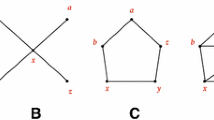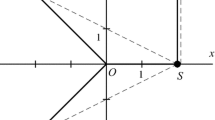Abstract
Partitioning games are useful on two counts: first, in modeling situations with restricted cooperative possibilities between the agents; second, as a general framework for many unrestricted cooperative games generated by combinatorial optimization problems.We show that the family of partitioning games defined on a fixed basic collection is closed under the strategic equivalence of games, and also for taking the monotonic cover of games. Based on these properties we establish the coincidence of the Mas-Colell, the classical, the semireactive, and the reactive bargaining setswith the core for interesting balanced subclasses of partitioning games, including assignment games, tree-restricted superadditive games, and simple network games.
Similar content being viewed by others
References
Aumann RJ, Maschler M (1964) The bargaining set for cooperative games. In: Dresher M, Shapley LS, Tucker AW(eds) Advances in game theory. Princeton University Press, Princeton, pp 443–476
Davis M, Maschler M (1967) Existence of stable payoff configurations for cooperative games. In: Shubik M(eds) Essays in mathematical economics in honour of Oskar Morgenstern. Princeton University Press, Princeton, pp 39–52
Granot D (1994) On a new bargaining set for cooperative games. Working paper, Faculty of Commerce and Business Administration, University of British Columbia, Vancouver, Canada
Granot D, Granot F (1992) On some network flow games. Math Oper Res 17: 792–841
Granot D, Granot F, Zhu WR (1997) The reactive bargaining set of some flow games and of superadditive simple games. Int J Game Theory 26: 207–214
Holzman R (2000) The comparability of the classical and the Mas-Colell bargaining sets. Int J Game Theory 29: 543–553
Kalai E, Zemel E (1982) Generalized network problems yielding totally balanced games. Oper Res 30: 998–1008
Kaneko M, Wooders MH (1982) Cores of partitioning games. Math Soc Sci 3: 313–327
Kuipers J (1994) Combinatorial methods in cooperative game theory. Ph.D. Thesis, University of Limburg, Maastricht, The Netherlands
Le Breton M, Owen G, Weber S (1992) Strongly balanced cooperative games. Int J Game Theory 20: 419–427
Mas-Colell A (1989) An equivalence theorem for a bargaining set. J Math Econ 18: 129–139
Myerson R (1977) Graphs and cooperation in games. Math Oper Res 2: 225–229
Owen G (1992) The assignment game: the reduced game. Annales D’Economie et de Statistique 25(26): 71–79
Owen G (1986) Values of graph-restricted games. SIAM J Algebr Discrete Methods 7: 210–220
Peleg B, Sudhölter P (2003) Introduction to the theory of cooperative games. Kluwer, Boston
Potters JAM, Reijnierse J (1995) Γ-component additive games. Int J Game Theory 24: 49–56
Quint T (1991) Necessary and sufficient conditions for balancedness in partitioning games. Math Soc Sci 22: 87–91
Shapley LS, Shubik M (1972) The assignment game I: the core. Int J Game Theory 1: 111–130
Solymosi T (1999) On the bargaining set, kernel and core of superadditive games. Int J Game Theory 28: 229–240
Solymosi T, Raghavan TES, Tijs S (2003) Bargaining sets and the core in permutation games. Cent Eur J Oper Res 11: 93–101
Sudhölter P, Potters JAM (2001) The semireactive bargaining set of a cooperative game. Int J Game Theory 30: 117–139
Vasin AA, Gurvich VA (1977) Reconcilable sets of coalitions. (in Russian) In: Questions in applied mathematics, Sibirsk. Energet. Inst., Akad. Nauk SSSR Sibirsk. Otdel., Irkutsk, pp 20–30
Author information
Authors and Affiliations
Corresponding author
Additional information
Prepared during the author’s Bolyai János Research Fellowship. Also supported by OTKA grant T46194.
Rights and permissions
About this article
Cite this article
Solymosi, T. Bargaining sets and the core in partitioning games. Cent Eur J Oper Res 16, 425–440 (2008). https://doi.org/10.1007/s10100-008-0070-2
Published:
Issue Date:
DOI: https://doi.org/10.1007/s10100-008-0070-2




